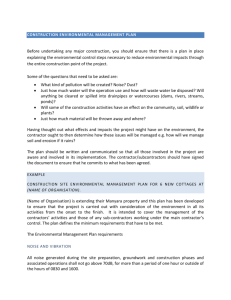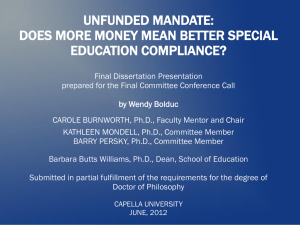Financial Fraud Law Report
advertisement
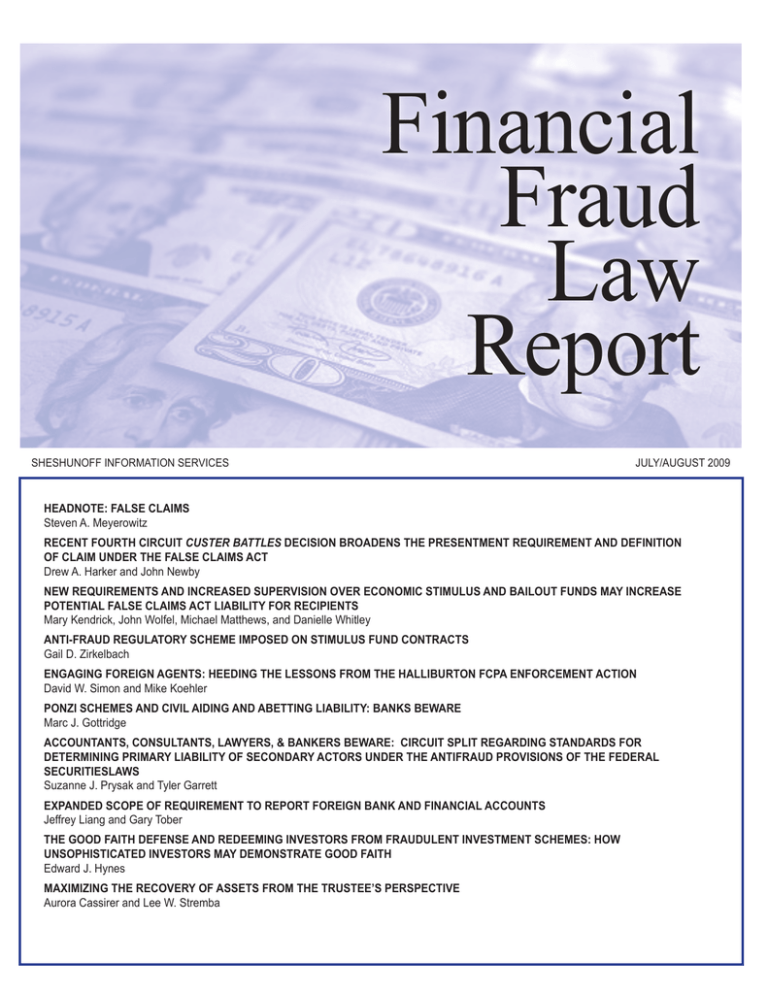
Financial Fraud Law Report Sheshunoff Information Services July/August 2009 HEADNOTE: False Claims Steven A. Meyerowitz Recent Fourth Circuit Custer Battles Decision Broadens the Presentment Requirement and Definition of Claim Under The False Claims Act Drew A. Harker and John Newby New Requirements and Increased Supervision Over Economic Stimulus and Bailout Funds May Increase Potential False Claims Act Liability for Recipients Mary Kendrick, John Wolfel, Michael Matthews, and Danielle Whitley Anti-Fraud Regulatory Scheme Imposed on Stimulus Fund Contracts Gail D. Zirkelbach Engaging Foreign Agents: Heeding the Lessons from the Halliburton FCPA Enforcement Action David W. Simon and Mike Koehler Ponzi Schemes and Civil Aiding and Abetting Liability: Banks Beware Marc J. Gottridge Accountants, Consultants, Lawyers, & Bankers Beware: Circuit Split Regarding Standards for Determining Primary Liability of Secondary Actors Under the Antifraud Provisions of the Federal SecuritiesLaws Suzanne J. Prysak and Tyler Garrett Expanded Scope of Requirement to Report Foreign Bank and Financial Accounts Jeffrey Liang and Gary Tober The Good Faith Defense and Redeeming Investors from Fraudulent Investment Schemes: How Unsophisticated Investors May Demonstrate Good Faith Edward J. Hynes Maximizing the Recovery of Assets from the Trustee’s Perspective Aurora Cassirer and Lee W. Stremba Anti-Fraud Regulatory Scheme Imposed on Stimulus Fund Contracts GAIL D. ZIRKELBACH In this article, the author discusses the anti-fraud regulatory scheme that applies to federal contractors along with similar additional regulations governing contracts funded under the American Recovery and Reinvestment Act (“ARRA”). Companies opting to accept federal contracts, including those funded under ARRA, must be aware of these regulatory requirements and develop and implement robust compliance mechanisms to avoid costly legal infractions. T he American Recovery and Reinvestment Act of 2009 (“ARRA” or “Act”) was enacted to stimulate the United States economy and counteract the recent economic downturn. Specifically, the Act injects $787 billion into the U.S. economy to be awarded by various federal agencies to U.S. companies. Many large and small U.S. companies facing declining business opportunities may choose to enter into ARRA funded contracts with the federal government, some for the first time, to generate much needed revenue. The ARRA funds, along with the billions of dollars spent every year by the federal government, do provide a wealth of opportunity for companies of all sizes at both the prime contract and subcontract level. There are, however, strings attached for companies choosing to accept any federal funds. Companies that accept federal funds, either directly or indirectly, must comply with a myriad of compliance regulations. In particular, any time the government purchases goods and services via contract, a government-wide procurement regulation known as the Federal Acquisition Regulation (“FAR”) applies.1 Any company choosing to accept federal funds, including ARRA funds, must comply with numerous FAR requirements. Federal contractors, therefore, must implement and maintain a robust compliance program specifically geared to addressing these requirements. There are two specific FAR clauses that exist to protect the government from fraud that are imposed on virtually all contractors that accept federal funds, including ARRA funds. The first clause requires contractors to adopt a comprehensive Code of Business Ethics (“Code”) and the second requires compliance with a “mandatory disclosure” rule. Moreover, any contract funded in whole or in part by ARRA funds carries additional compliance requirements, which must be implemented by companies obtaining contracts funded by ARRA. This article will first discuss the two general FAR requirements and then the stimulus specific requirements. GENERAL FAR REQUIREMENTS Code of Business Ethics FAR mandates the adoption of a Code within 30 days of contract award for companies in receipt of Gail D. Zirkelbach of Jackson Kelly PLLC has over 23 years of experience representing clients regarding various government contract and compliance issues, claim preparation, internal investigations, and fraud litigation. She may be contacted at gdzirkelbach@jacksonkelly.com. Ms. Zirkelbach wishes to thank Ricki Kelly for her assistance in preparing these materials. Published in the July/August 2009 issue of Financial Fraud Law Report. Copyright ALEXeSOLUTIONS, INC. 51 Financial Fraud Law Report contracts expected to exceed $5 million with a performance period of 120 days or more.2 Contractors that hold contracts for the acquisition of commercial items, which are items customarily used by the general public, or a contract that is performed entirely outside the U.S. are, however, exempt from this requirement.3 If the Code requirement applies, the contractor must make the Code available to each employee engaged in the performance of the contract and take steps to promote an organizational culture that encourages ethical conduct and a commitment to compliance with the law.4 Further, contractors are required to flow these requirements down to subcontracts that exceed $5 million unless the subcontract is for the acquisition of commercial items or performed entirely outside the U.S.5 The content of a federal contractor’s Code varies depending on the size of the company and the nature of work performed. All Codes, however, must address generally procedures for employees to report any fraudulent conduct or suspicious activity internally to an identified Compliance Officer. Additionally, a Code should address the following topics if applicable to the company: • Specific regulatory compliance; • Export controls; • Financial reporting and records (including employee timekeeping, bidding for and negotiating contracts, and requests for payment from the government); • Accounting for government property; • Organizational conflicts of interest; • Quality assurance; and • Human resource policies, including equal employment and affirmative action commitments. In order to achieve a genuine culture of compliance, all federal contractors should implement employee training programs for all levels of the company, including the executive level. Moreover, federal contractors that are required to implement a Code under the criterion identified above are also required to implement a compliance program that includes training. Specifically, those contractors must take: 52 …reasonable steps to communicate periodically and in a practical manner the Contractor’s standards and procedures and other aspects of the Contractor’s business ethics awareness and compliance program and internal control system, by conducting effective training programs and otherwise disseminating information appropriate to an individual’s respective roles and responsibilities.6 Thus, companies seeking federal contracts, including those funded by ARRA, that meet the criteria must implement a Code and an ethics awareness and compliance training program, if they are not already in place. If a Code and training program are already in place, they should be reviewed to ensure that applicable requirements are addressed. Additionally, even if a contractor is not legally required to implement a Code or an employee training program, it may be advisable to do so to decrease the company’s risk of other types of regulatory noncompliance. Mandatory Disclosure Rule As of December 12, 2008, all federal contractors are required to self-disclose in a “timely” fashion certain violations of criminal law, violations of the civil False Claims Act (“FCA”)7 and “significant overpayments” that occur “in connection with the award, performance, or closeout” of a government contract if “credible evidence” that such violations have taken place exists.8 Under these regulations the failure to report the required information is an independent ground for suspension and debarment.9 Further, the reporting duty applies retroactively to any contracts closed within three years, regardless of dollar value.10 This reflects a significant change from previous regulations that merely offered contractors leniency from the government in exchange for their voluntary disclosure of violations. It remains unclear exactly how the new disclosure requirements will be implemented. However, the government now has a new mechanism for combating contractor fraud, which will require all contractors receiving federal funds, including stimulus finds, to be cognizant of their added responsibilities. In addition to the FAR requirement discussed above that applies to all federal contracts and subcon- Published in the July/August 2009 issue of Financial Fraud Law Report. Copyright ALEXeSOLUTIONS, INC. Anti-Fraud Regulatory Scheme Imposed on Stimulus Fund Contracts tracts, any contracts exceeding $5 million, and lasting in duration longer than 120 days must contain the following clause: The Contractor shall timely disclose, in writing, to the agency Office of the Inspector General (OIG), with a copy to the Contracting Officer, whenever, in connection with the award, performance, or closeout of this contract or any subcontract thereunder, the Contractor has credible evidence that a principal, employee, agent, or subcontractor of the Contractor has committed (A) A violation of Federal Criminal law involving fraud, conflict of interest, bribery, or gratuity violations found in Title 18 of the United States Code; or (B) A violation of the civil False Claims Act (31 U.S.C. 3729-3733).11 This clause must also be included in any subcontracts valued above $5 million that have performance periods longer than 120 days. While the contract clause imposes similar requirements to the suspension and debarment regulations, there are some slight differences. Specifically, the contract clause provides that disclosures must be made to the OIG of the agency responsible for the basic contract whereas the suspension and debarment regulations require disclosure to “the Government.”12 Additionally, the contract clause does not contain a requirement to disclose “significant overpayments,” as the regulations do. FAR does not identify additional penalties associated with violation of the contract clause, but there is a possibility that a contractor could have its cost recovery on an existing contract limited if failure to disclose the required information constitutes a material breach of contract. As these rules were only recently implemented, the exact interpretation of the requirements remains unclear. However, particular attention should be paid to the following ambiguous terms, which are present in both the suspension and debarment provision and the contract clause: “timely,” “credible evidence,” and “principal.” Federal contractors are required to “timely disclose” the required information. According to the regulation’s supplementary information, the timeliness issue was left intentionally vague, as a suggested 30 day rule was not included.13 Until this standard is clarified, federal contractors should sub- mit disclosures as quickly as possible after a violation is discovered to ensure compliance. The “credible evidence” standard contained in the rule is a higher standard than the “reasonable grounds to believe” standard incorporated in the previous voluntary disclosure program. This higher standard appears to indicate that the government expects federal contractors to examine evidence and assess its credibility before making any disclosure. The rule does not appear to require a full investigation, but does require all federal contractors to establish set procedures for the reporting of, and inquiry into, the particular circumstances of each potentially disclosable incident. In sum, all contractors accepting federal funds must establish procedures to learn of potentially disclosable violations and to analyze carefully all such violations to avoid possible penalties for non-disclosure. Further, the regulations impose disclosure responsibilities on a “principal” of a contractor, which is broadly defined as one having primary management or supervisory power.14 Moreover, principals are required to disclose only violations as to which they have actual knowledge, but are not required to disclose violations as to which they should have had knowledge. Given the obligations imposed upon principals, federal contractors should train any employees who may be considered a “principal” regarding these additional responsibilities. To ensure compliance with the mandatory disclosure rule, any company accepting ARRA funds must identify a high-level individual to serve as a Compliance Officer to assume responsibility for the effectiveness and efficiency of the company’s internal control procedures. Federal contractors should consider implementing a procedure that ensures individuals who do not act ethically are not promoted to principal levels, which may involve a detailed character interview with others who know the individual or a background investigation. Additionally, all non- Published in the July/August 2009 issue of Financial Fraud Law Report. Copyright ALEXeSOLUTIONS, INC. 53 Financial Fraud Law Report small business federal contractors, with contracts other than for the acquisition of commercial items, must “provide for…an internal reporting mechanism, such as a hotline, which allows for anonymity or confidentiality, by which employees may report suspected instances of improper conduct, and instructions that encourage employees to make such reports.”15 This hotline should function to alert the company to potentially disclosable problems. It is critical for federal contractors to establish reliable procedures to ensure violations associated with their government contracts are discovered, investigated and disclosed in a timely manner to the appropriate government authority. In sum, all contractors accepting federal funds must establish procedures to learn of potentially disclosable violations and to analyze carefully all such violations to avoid possible penalties for non-disclosure. When a disclosable violation is discovered, a principal must complete and submit the disclosure form located on the General Services Administration (“GSA”) web site.16 The form asks for information including, but not limited to, principal contact information, an estimated amount of loss, the date the violation was discovered, whether an internal investigation was conducted, whether the duration of the violation was less than three months, the number of people involved in the violation, whether the violation constitutes a potential national security threat, and whether there are any witnesses to the violation. Ensuring compliance with the mandatory disclosure rule may also require a federal contractor to establish a new record keeping system to document reports and corrective action when possible violations are discovered. Maintaining records of issues that were reported and investigated internally will facilitate any subsequent government investigation. Establishing set procedures will make disclosure easier for the company and protect it should a government investigation take place. ARRA REQUIREMENTS In addition to the Code requirements and mandatory disclosure obligations, companies accepting ARRA funds must comply with additional rules contained in FAR applicable only to ARRA funded contracts. These interim regulations were mandated by 54 ARRA and address the following: • Whistleblower protection; • The “Buy American” requirements for construction materials; • Requirements for publicizing contract actions; • Reporting requirements; and • Government Accountability Office (“GAO”) and Inspector General (“IG”) access to records and contractor employees. The Civilian Agency Acquisition Council and the Defense Acquisition Council accepted written comments on these rules until June 1, 2009 prior to the release of final rules. However, the interim rules were effective March 31, 2009 and, therefore, apply to all ARRA funded contracts issued after that date. Further, the rules direct Contracting Officers to modify all contracts finalized before March 31, 2009 to include all of the requirements except the requirement for publicizing contract actions. Whistleblower Protections The interim regulations concerning whistleblower protections prohibit contractors receiving ARRA funds from “discharging, demoting, or discriminating against employees as a reprisal for disclosing certain covered information to certain categories of government officials or a person with supervisory authority over the employee.”17 The whistleblower protections are broad in scope and apply to virtually all contracts awarded with ARRA funds, including those below the simplified acquisition threshold, commercial item contracts at both the prime and subcontract levels, and Commercially Available Off-the-Shelf (“COTS”) Item contracts.18 To avoid penalties for an alleged reprisal, the regulations require a federal contractor to demonstrate by clear and convincing evidence that it would have taken the action constituting the alleged reprisal in the absence of the disclosure.19 Penalties for violations include an agency order to reinstate the employee and/or an agency order to pay the employee an amount equal to the aggregate amount of all costs and expenses, including attorney fees and expert witness fees that were reasonably incurred in the process Published in the July/August 2009 issue of Financial Fraud Law Report. Copyright ALEXeSOLUTIONS, INC. Anti-Fraud Regulatory Scheme Imposed on Stimulus Fund Contracts of bringing the complaint regarding the reprisal.20 The agency must make a determination whether a contractor subjected a complainant to a reprisal prohibited by the regulation no later than 30 days after receiving an IG report regarding the events.21 Thus, companies awarded ARRA funded contracts must be particularly sensitive to avoiding even the appearance of retaliation against their employees for raising concerns. Management personnel in these companies must be alerted to these requirements. In addition, companies should continually remind their employees of the importance of reporting any issues and guarantee there will be no retaliation to ensure that their employees understand both their obligations and protections. “Buy American” Requirements The interim regulations concerning “Buy American” requirements apply to all ARRA funded contracts, regardless of size or duration, for the construction, alteration, maintenance, or repair of a public building or public work. The regulations require that all of the iron, steel, and manufactured goods used in these projects be produced in the U.S.,22 unless one of the following three waiver circumstances is satisfied: (1) the goods are not produced in the U.S. in sufficient and reasonably available quantities and of a satisfactory quality; (2) the inclusion of iron, steel, or manufactured goods produced in the U.S. will increase the cost of the contract by more than 25 percent; or (3) applying the domestic preference would be inconsistent with the public interest.23 If an agency determines that one of the waiver circumstances applies and selects a proposal that includes foreign products, it must publish in the Federal Register a detailed written justification for its use of the exception.24 In addition to the waiver circumstances, these regulations may not apply to construction material produced in certain designated countries, known as “Recovery Act Designated Countries” (“RADC”), depending on the contract value.25 RADC include nations that are signatories to the World Trade Organization Government Procurement Agreement or a U.S. free trade agreement and are “least developed countries.”26 Interestingly, however, Congress specifically excluded Caribbean Basin countries from “designated countries” for ARRA purposes.27 Therefore, for ARRA contracts with an estimated value of $7,443,000 or more, eligible construction materials from Recovery Act designated countries such as Chile and Australia are treated the same as domestic products.28 Federal contractors accepting ARRA funded contracts must consider these requirements in addition to the existing FAR clauses regarding the Buy American Act (“BAA”).29 The FAR BAA provision requires contractors performing federal procurement contracts use “domestic construction materials” in construction, alteration, or repair of a public building or public work in the U.S.30 Unlike the FAR clauses implementing the BAA, the new ARRA rule definition of “domestic construction materials” does not consider the source of the components of manufactured goods (i.e. raw materials or parts used to manufacture such goods). The recent adoption of the mandatory disclosure rule along with the new rules that apply to any contracts funded by ARRA continue the trend of increased government oversight of federal contractors to decrease contractor fraud. Instead the ARRA requirements focus on whether the “manufacture” of the goods occurs in the U.S. and permits the use of foreign-sourced components and subcomponents in construction materials so long as all of the manufacture occurs in the U.S. This is a less rigorous standard than the BAA definition of “domestic end product” found at FAR 52.225-1(a) which requires that the cost of a product’s components mined, produced, or manufactured in the U.S. exceeds 50 percent of the cost of all its components. As ARRA § 1605 does not specifically address “unmanufactured construction materials,” they remain subject only to established BAA sourcing requirements (including a “component test”) found at FAR 25.602(b). Thus, federal contractors accepting ARRA funds must ensure compliance with both the new Buy American requirements and the BAA. Published in the July/August 2009 issue of Financial Fraud Law Report. Copyright ALEXeSOLUTIONS, INC. 55 Financial Fraud Law Report Publicizing Contract Actions Pursuant to the interim regulations, contracts, including proposed contract actions, issued under task or delivery orders that are expected to exceed $25,000 funded in whole or in part by ARRA, must follow the publication procedures in FAR 5.201 that require contract actions to be posted at http://www. fedbizopps.gov.31 Contracting Officers are directed to use the instructions on that site to identify proposed contract actions, and must ensure that the description required by FAR 5.207(a)(16) includes a narrative of the products and services that is clear and unambiguous to the general public.32 Under this rule, procurement officials must also provide a rationale to the public for any contract action that is not fixed-price and/or does not use a competitive approach.33 These requirements demonstrate the importance of transparency and accountability related to the procurement of ARRA funds. The publicizing requirement will provide greater transparency as the public will have access to the values and frequency of contracts funded by ARRA. Further, the emphasis on fixed-price contracts is consistent with the Obama Administrations’ 2010 budget proposal (“Proposal”), which noted that cost-type contracts increased more than 75 percent under the Bush administration, and that total federal spending on contracts more than doubled from approximately $208 billion in 2000 to more than $423 billion in 2006. Both ARRA and the Proposal evidence the Obama Administration’s focus on ferreting out fraud and waste in the government’s spending, which it intends to accomplish by requiring contract actions be publicized and evaluating and minimizing the use of cost-type contracts. Reporting Requirements Pursuant to the interim regulations, contractors receiving ARRA funds are required to submit quarterly online reports at http://www.federalreporting.gov including general contract information as well as a description of the services provided and the jobs created through the contract.34 For contractors receiving 80 percent or more of its annual gross revenues from federal contracts and $25 million or more in annual gross revenues from federal contracts, including subcontracts, the names and total compensation of each 56 of the five most highly compensated officers must be disclosed if the public does not already have access to this information via Securities and Exchange Commission reports.35 The first reports are due by July 10, 2009 and must be submitted thereafter no later than the 10th day after the end of each calendar quarter.36 These requirements also require prime contractors to report this information for at least some of their first tier subcontractors.37 As with the publicizing requirements, the reporting requirements provide additional means for the public and government officials to review how ARRA funds are spent. Specifically, the requirement to disclose progress on each project and the compensation of the five most highly compensated officers creates greater transparency in the procurement process and will make it more difficult for federal contractors to engage in fraudulent activity. Federal contractors, therefore, must carefully monitor the reportable information and ensure it is timely and accurately posted to the reporting web site. GAO and IG Access to Records and Contractor Employees The GAO and IG Access to Records aspect of the interim regulations, which applies to commercial item contracts, COTS contracts, and contracts below the simplified acquisition threshold, expands the authority of the government to audit both contract and subcontract records and interview employees regarding the records for contracts funded by ARRA.38 Specifically, during the course of any such audit, the GAO and Agency IG have access to all relevant contractor and subcontractor records and all contractor personnel.39 These regulations also provide the GAO authority to interview subcontractor employees regarding contract records.40 In addition to the government access granted to contract records and contractor employees for ARRA funded contracts, FAR was also amended on March 31, 2009 by the Duncan Hunter Defense Authorization Act to grant GAO access to records and contractor employees when the contract is funded by any federal funds.41 While this access is more general in application as it applies to any federal contracts, it is not as broad in scope as the ARRA regulation as ac- Published in the July/August 2009 issue of Financial Fraud Law Report. Copyright ALEXeSOLUTIONS, INC. Anti-Fraud Regulatory Scheme Imposed on Stimulus Fund Contracts cess was not granted with respect to commercial item contracts.42 Companies accepting any type of federal funds must, therefore, be prepared for the possibility of audits by the government. This additional access to contractor and subcontractor employees provides the government with another anti-fraud tool. The opportunity to interview employees increases the government’s insight into contracts and could reveal information that would otherwise be undiscovered. CONCLUSION The ARRA funds provide businesses with great opportunities for contracting with the federal government. Accepting any government funds, however, requires contractors to comply with numerous regulations in order to avoid costly legal infractions. The recent adoption of the mandatory disclosure rule along with the new rules that apply to any contracts funded by ARRA continue the trend of increased government oversight of federal contractors to decrease contractor fraud. It is now more important than ever for non-government contractors to evaluate compliance requirements before accepting federal funds, especially ARRA dollars, and to implement the necessary policies and procedures to minimize the possibility of violations. NOTES 41 U.S.C. §§ 405a, 421(c) (2006). FAR 52.203-13(b). 3 FAR 2.101, 52.203-13(c). 4 FAR 52.203-13(b)(1-2). 5 FAR 52.203-14(d). 6 FAR 52.203-13(c)(1)(i-ii). 7 False Claims Act, 31 U.S.C. §§ 3729-3733. 8 FAR 9.406-2(b)(1)(vi)(A-C). 9 Debarment excludes a contractor from government contracting and government-approved subcontracting whereas suspension disqualifies a contractor temporarily from government contracting and government-approved subcontracting. FAR 2.101. 10 FAR 9.406-2(b)(1)(vi). 11 FAR 52.203-13(b)(3)(i)(A-B). 12 FAR 9.406-2(b)(1)(vi), 52.203-13(b)(3)(i)(A-B). 13 Contractor Business Ethics Compliance Program and 1 2 Disclosure Requirements, 73 Fed. Reg. 67,064, 67,074 (Nov. 12, 2008) (codified at 48 C.F.R. §§ 2, 3, 9, 42, 52). 14 FAR 52.203-13(a). 15 FAR 52.203-13(c), 52.203-13(c)(2)(ii), 52.203-13(c) (2)(ii)(D). 16 See http://oig.gsa.gov/integrityreport.htm. 17 American Recovery and Reinvestment Act of 2009-Whistleblower Protections, 74 Fed. Reg. 14,633 (interim rule effective Mar. 31, 2009) (to be codified at 48 CFR §§ 3, 52). 18 Id. at 14,633-34. 19 Id. at 14,635. 20 Id. 21 Id. 22 American Recovery and Reinvestment Act of 2009Buy American Requirements for Construction Material, 74 Fed. Reg. 14,623, 14,624-35 (interim rule effective Mar. 31, 2009) (to be codified at 48 CFR §§ 1, 5, 25, 52). 23 Id. at 14,626-27. 24 Id. at 14,629. 25 Id. at 14,626-27. 26 Id. 27 Id. at 14,627. 28 Id.; FAR 25.400. 29 Buy American Act, 41 U.S.C. §§ 10a-10d. 30 FAR Subpart 25.2. 31 American Recovery and Reinvestment Act of 2009-Publicizing Contract Actions, 74 Fed. Reg. 14,636, 14,638 (interim rule effective Mar. 31, 2009) (to be codified at 48 CFR §§ 4, 5, 8, 13, 16). 32 Id. 33 Id. 34 ARRA § 1512; American Recovery and Reinvestment Act of 2009-Reporting Requirements, 74 Fed. Reg. 14,639, 14,645-46 (interim rule effective Mar. 31, 2009) (to be codified at 48 CFR §§ 4, 52). 35 Id. 36 Id. at 14,640, 14,645. 37 Id. 38 ARRA § 1512; American Recovery and Reinvestment Act of 2009-GAO/IG Access, 74 Fed. Reg. 14,646 (interim rule effective Mar. 31, 2009) (to be codified at 48 CFR §§ 12, 13, 14, 15, 52). 39 Id. 40 Id. 41 GAO Access to Contractor Employees, 74 Fed. Reg. 14,649 (interim rule effective Mar. 31, 2009) (to be codified at 48 CFR §§ 12, 52). 42 Id. Published in the July/August 2009 issue of Financial Fraud Law Report. Copyright ALEXeSOLUTIONS, INC. 57

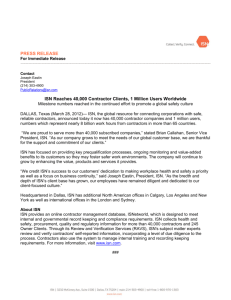
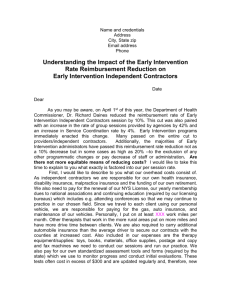
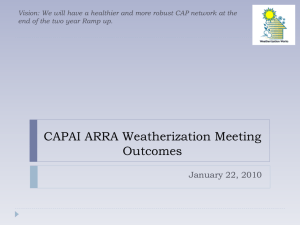
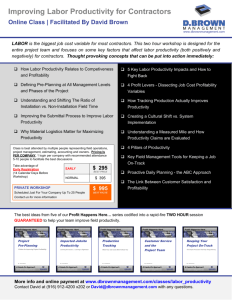

![From [Name] [Business Name] [Business Address] [Phone Number](http://s2.studylib.net/store/data/010062634_1-5404f95cf2a6b8966783293b2727cd16-300x300.png)
